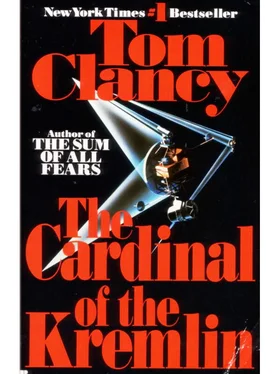Tom Clancy - The Cardinal of the Kremlin
Здесь есть возможность читать онлайн «Tom Clancy - The Cardinal of the Kremlin» весь текст электронной книги совершенно бесплатно (целиком полную версию без сокращений). В некоторых случаях можно слушать аудио, скачать через торрент в формате fb2 и присутствует краткое содержание. Год выпуска: 1988, Жанр: Триллер, на английском языке. Описание произведения, (предисловие) а так же отзывы посетителей доступны на портале библиотеки ЛибКат.
- Название:The Cardinal of the Kremlin
- Автор:
- Жанр:
- Год:1988
- ISBN:нет данных
- Рейтинг книги:3 / 5. Голосов: 1
-
Избранное:Добавить в избранное
- Отзывы:
-
Ваша оценка:
- 60
- 1
- 2
- 3
- 4
- 5
The Cardinal of the Kremlin: краткое содержание, описание и аннотация
Предлагаем к чтению аннотацию, описание, краткое содержание или предисловие (зависит от того, что написал сам автор книги «The Cardinal of the Kremlin»). Если вы не нашли необходимую информацию о книге — напишите в комментариях, мы постараемся отыскать её.
The Cardinal of the Kremlin — читать онлайн бесплатно полную книгу (весь текст) целиком
Ниже представлен текст книги, разбитый по страницам. Система сохранения места последней прочитанной страницы, позволяет с удобством читать онлайн бесплатно книгу «The Cardinal of the Kremlin», без необходимости каждый раз заново искать на чём Вы остановились. Поставьте закладку, и сможете в любой момент перейти на страницу, на которой закончили чтение.
Интервал:
Закладка:
As early as the 1950s, both America and the Soviet Union had begun research in ballistic-missile defense, the latter at Sary Shagan in southwestern Siberia. A workable Soviet system had almost been deployed in the late 1960s, but the advent of MIRVs had utterly invalidated the work of fifteen years – perversely, for both sides. The struggle for ascendancy between offensive and defensive systems always tended to the former.
But no longer. Laser weapons and other high-energy-projection systems, mated to the power of computers, were a quantum jump into a new strategic realm. A workable defense, Bondarenko's report told Colonel Filitov, was now a real possibility. And what did that mean?
It meant that the nuclear equation was destined to return to the classic balance of offense and defense, that both elements could now be made part of a single strategy. The professional soldiers found this a more satisfying system in the abstract – what man wishes to think of himself as the greatest murderer in history? – but now tactical possibilities were raising their ugly heads. Advantage and disadvantage; move and countermove. An American strategic-defense system could negate all of Soviet nuclear posture. If the Americans could prevent the SS-18s from taking out their land-based missiles, then the disarming first strike that the Soviets depended upon to limit damage to the Rodina was no longer possible. And that meant that all of the billions that had been sunk into ballistic-missile production were now as surely wasted as though the money had been dumped into the sea.
But there was more. Just as the scutum of the Roman legionnaire was seen by his barbarian opponent as a weapon that enabled him to stab with impunity, so today SDI could be seen as a shield from behind which an enemy could first launch his own disarming first strike, then use his defenses to reduce or even eliminate the effect of the resulting retaliatory strike.
This view, of course, was simplistic. No system would ever be foolproof – and even if the system worked, Misha knew, the political leaders would find a way to use it to its greatest dis advantage; you could always depend on politicians for that. A workable strategic defense scheme would have the effect of adding a new element of uncertainty to the equation. It was unlikely that any country could eliminate all incoming warheads, and the death of as "few" as twenty million citizens was too ghastly a thing to contemplate, even for the Soviet leadership. But even a rudimentary SDI system might kill enough warheads to invalidate the whole idea of counterforce.
If the Soviets had such a system first, the meager American counterforce arsenal could be countered more easily than the Soviet one, and the strategic situation for which the Soviets had worked thirty years would remain in place. The Soviet government would have the best of both worlds, a far larger force of accurate missiles with which to eliminate American warheads, and a shield to kill most of the retaliatory strike against their reserve missile fields – and the American sea-based systems could be neutralized by elimination of their GPS navigation satellites, without which they could still kill cities, but the ability to attack missile silos would be irretrievably gone.
The scenario Colonel Mikhail Semyonovich Filitov envisaged was the standard Soviet case study. Some crisis erupted (the Middle East was the favorite, since nobody could predict what would happen there), and while Moscow moved to stabilize matters, the West interfered – clumsily and stupidly, of course – and started talking openly in the press about a nuclear confrontation. The intelligence organs would flash word to Moscow that a nuclear strike was a real possibility. Strategic Rocket Force's SS-18 regiments would secretly go to full alert, as would the new ground-based laser weapons. While the Foreign Ministry airheads – no military force is enamored of its diplomatic colleagues – struggled to settle things down, the West would posture and threaten, perhaps attacking a Soviet naval force to show its resolve, certainly mobilizing the NATO armies to threaten invasion of Eastern Europe. Worldwide panic would begin in earnest. When the tone of Western rhetoric reached its culmination, the launch orders would be issued to the missile force, and 300 SS-18s would launch, allocating three warheads to each of the American Minuteman silos. Smaller weapons would go after the submarine and bomber bases to limit collateral casualties as much as possible – the Soviets had no wish to exacerbate the situation more than necessary. Simultaneously, the lasers would disable as many American reconnaissance and navigation satellites as possible but leave the communications satellites intact – a gamble calculated to show "good" intent. The Americans would not be able to respond to the attack before the Soviet warheads struck. (Misha worried about this, but information from KGB and GRU said that there were serious flaws in the American command-and-control system, plus the psychological factors involved.) Probably the Americans would keep their submarine weapons in reserve and launch their surviving Minutemen at Soviet missile silos, but it was expected that no more than two to three hundred warheads would survive the first strike; many of those would be aimed at empty holes anyway, and the defense system would kill most of the incoming weapons.
At the end of the first hour, the Americans would realize that the usefulness of their submarine missiles was greatly degraded. Constant, carefully prepared messages would be sent via the Moscow-Washington Hot Line: WE CANNOT LET THIS GO ANY FURTHER. And, probably, the Americans would stop and think. That was the important part – to make people stop and think. A man might attack cities on impulse or in a state of rage, but not after sober reflection.
Filitov was not concerned that either side would see its defense systems as a rationale for an offensive strike. In a crisis, however, their existence could mitigate the fear that prevented its launch – if the other side had no defenses. Both sides, therefore, had to have them. That would make a first strike far less likely, and that would make the world a safer place. Defensive systems could not be stopped now. One might as easily try to stop the tide. It pleased this old soldier that intercontinental rockets, so destructive to the ethic of the warrior, might finally be neutralized, that death in war would be returned to armed men on the field of battle, where it belonged…
Well , he thought, you're tired, and it's too late for that sort of deep thinking. He'd finish up this report with the data from Bondarenko's final draft, photograph it, and get the film to his cutout.
CHAPTER 8
Document Transfer
It was almost dawn when the Archer found the wreckage of the airplane. He had ten men with him, plus Abdul. They'd have to move fast. As soon as the sun rose over the mountains the Russians would come. He surveyed the wreck from a knoll. Both wings had been sheered off at the initial impact, and the fuselage had rocketed forward, up a gentle slope, tumbling and breaking apart until only the tail was recognizable. He had no way of knowing that it had taken a brilliant pilot to accomplish this much, that getting the airplane down under any kind of control was a near miracle. He gestured to his men, and moved quickly toward the main body of wreckage. He told them to look for weapons, then any kind of documents. The Archer and Abdul went to what was left of the tail.
As usual, the scene of the crash was a contradiction. Some of the bodies were torn apart, while others were superficially intact, their deaths caused by internal trauma. These bodies looked strangely at peace, stiff but not yet frozen by the low temperature. He counted six who'd been in the after section of the aircraft. All, he saw, were Russians, all in uniform. One wore the uniform of a KGB captain and was still strapped in his seat. There was a pink froth around his lips. He must have lived a little after the crash and coughed up blood, the Archer thought. He kicked the body over and saw that handcuffed to the man's left hand was a briefcase. That was promising. The Archer bent down to see if the handcuff could be taken off easily, but he wasn't that lucky. Shrugging, he took out his knife. He'd just have to cut it off the body's wrist. He twisted the hand around and started–
Читать дальшеИнтервал:
Закладка:
Похожие книги на «The Cardinal of the Kremlin»
Представляем Вашему вниманию похожие книги на «The Cardinal of the Kremlin» списком для выбора. Мы отобрали схожую по названию и смыслу литературу в надежде предоставить читателям больше вариантов отыскать новые, интересные, ещё непрочитанные произведения.
Обсуждение, отзывы о книге «The Cardinal of the Kremlin» и просто собственные мнения читателей. Оставьте ваши комментарии, напишите, что Вы думаете о произведении, его смысле или главных героях. Укажите что конкретно понравилось, а что нет, и почему Вы так считаете.






![Александр Ирвин - Tom Clancy’s The Division 2. Фальшивый рассвет [litres]](/books/417744/aleksandr-irvin-tom-clancy-s-the-division-2-falsh-thumb.webp)





